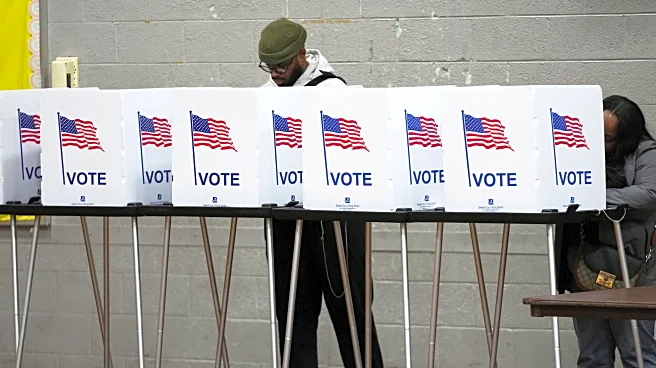What's Happening?
House Speaker Mike Johnson is facing criticism from within his party regarding the ongoing shutdown of the House of Representatives. The shutdown, which has lasted nearly five weeks, was initiated as a strategic
move to pressure Senate Democrats into voting for a Republican plan to temporarily fund the government. However, this strategy has not succeeded, as Senate Democrats have not felt compelled to change their votes. The shutdown has led to significant disruptions, including postponed or canceled House committee hearings and legislative actions. Despite the criticism, Johnson remains steadfast in his approach, holding daily news conferences to emphasize that the responsibility to reopen the government lies with Senate Democrats.
Why It's Important?
The prolonged shutdown of the House has significant implications for U.S. governance and public policy. It has disrupted legislative processes and affected federal agencies, leading to service cuts and mass firings. The shutdown has also become a political battleground, with Democrats using the situation to criticize Republicans and highlight their own policy priorities, such as extending tax credits for health insurance exchanges. The inability to reach a compromise reflects deep partisan divisions and could impact public perception of both parties, potentially influencing future elections. The shutdown's continuation may further strain government operations and affect public services.
What's Next?
As the shutdown continues, pressure is mounting on both parties to find a resolution. House Republicans, particularly those from swing districts, are urging Speaker Johnson to seek a compromise on health insurance tax credits. Meanwhile, Senate Democrats remain firm in their stance, demanding policy concessions. The situation may lead to increased political maneuvering and negotiations in the coming weeks. The outcome of these discussions could have lasting effects on legislative priorities and party dynamics. Stakeholders, including political leaders and civil society groups, are likely to intensify their efforts to influence the resolution process.
Beyond the Headlines
The shutdown highlights broader issues within U.S. politics, such as the challenges of bipartisan cooperation and the impact of political strategies on governance. It raises questions about the effectiveness of traditional negotiation tactics and the role of political leadership in resolving impasses. The situation also underscores the importance of public perception and media coverage in shaping political narratives. As the shutdown persists, it may prompt discussions on reforming legislative processes and improving government accountability.










